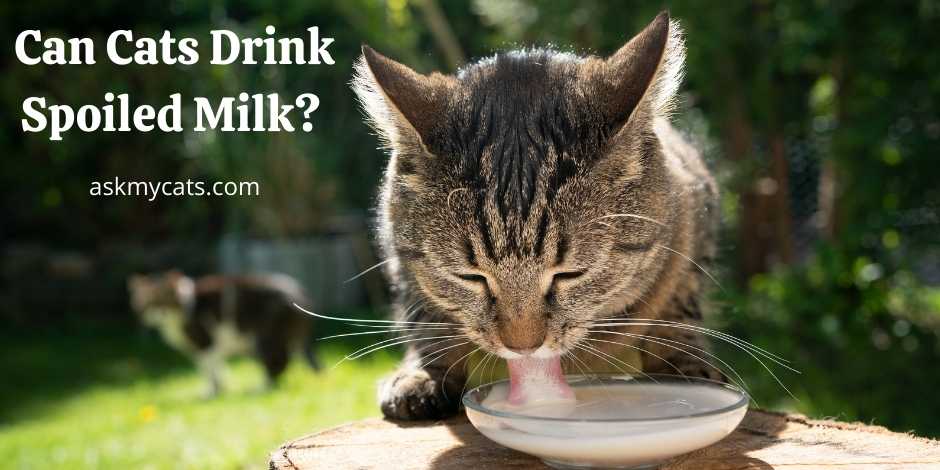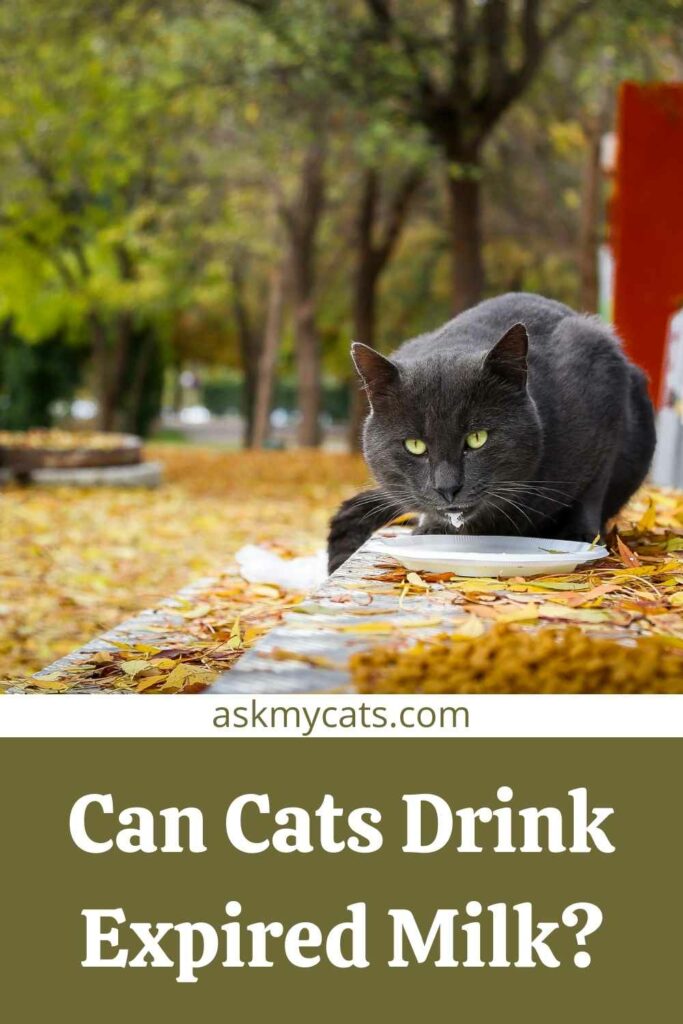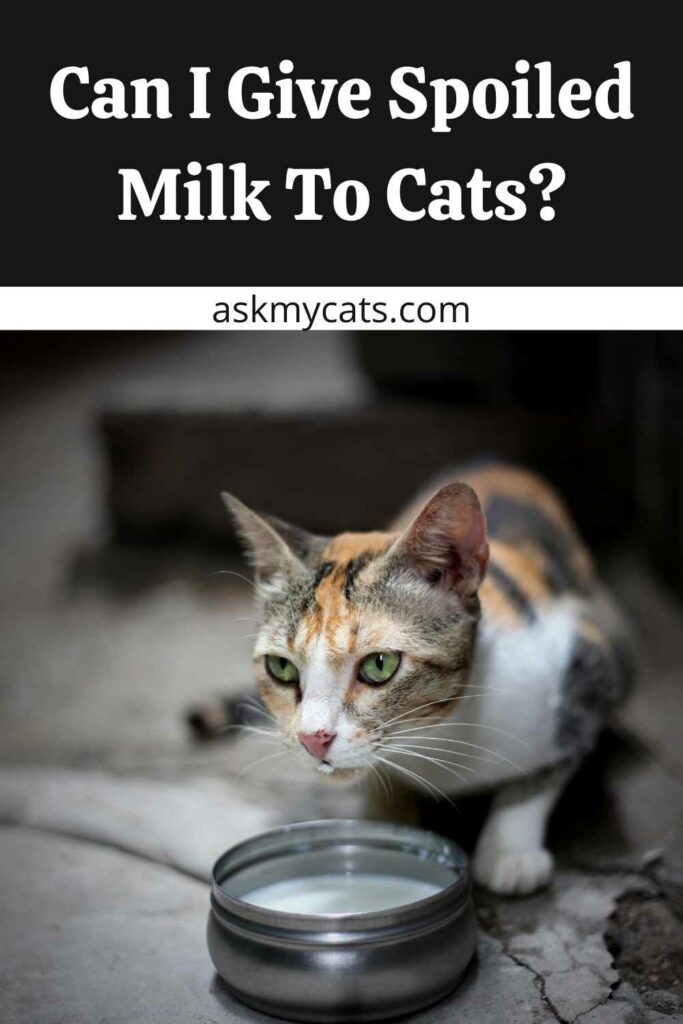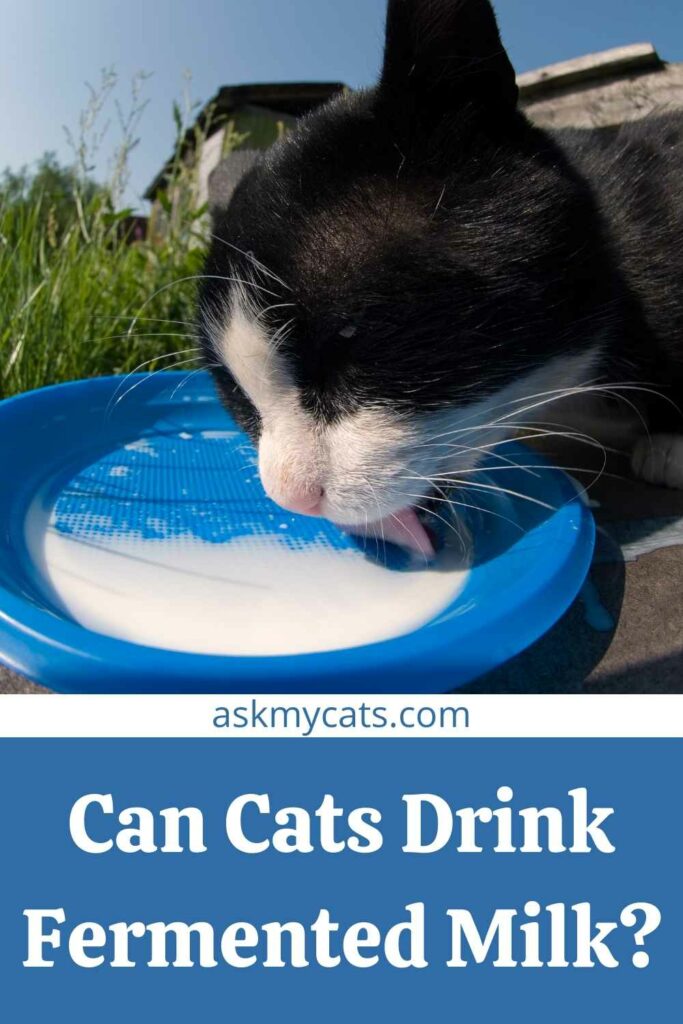The majority of cats are lactose intolerant, and dairy products can cause diarrhea and vomiting. There are certain cat milk choices that are more appropriate and contain less lactose. These, on the other hand, should only be used in moderation.
Spoiled milk is likely to produce vomiting in cats, which can lead to dehydration. When it comes to consuming milk, cats should never be fed spoiled cow’s milk.
Many cats are lactose intolerant, and cow’s milk causes severe diarrhea that can be fatal to a kitten. If this occurs, take the animal to the veterinarian.


Give Your Cat the Perfect Day
Get the Free Ebook!
Can Cats Drink Expired Milk?
A little sip of expired milk is unlikely to result in any symptoms in cats other than a foul taste. Drinking excessive volumes of spoilt milk can induce stomach upset, which can result in abdominal cramps, vomiting, and diarrhea (like a foodborne illness).

Symptoms caused by consuming tainted milk usually disappear within 12-24 hours. Cats should only be given milk in moderation. For cats who love the flavor of milk, it should be regarded as a “reward.” When giving milk to your cat, don’t give him too much.
A couple of teaspoons are more than plenty. Also, limit it to once a week or once every two weeks.
Fresh, clean water is all that cats will ever require. If you want to offer your cat milk, you may get lactose-free cow’s milk (lactose is the sugar present in milk) from your pet store, vet, or supermarket; some even have added vitamins and minerals.
Adult cats should not drink milk (unless it is lactose-free and designed for cats) since they cannot digest lactose and will become unwell as a result.
While kittens can digest lactose, they should only be fed kitten formula or suckle on their mother cat’s milk. Other types of milk have more lactose than they can stomach, do not satisfy their nutritional needs, and will make them unwell.
This is not to imply that a cat will not try to drink spoilt milk; rather, it means that you should not make milk available to them that has not been properly prepared for cats of that age.
Also, check out can cats drink lactose free milk
Can I Give Spoiled Milk To Cats?
No, feeding spoilt milk to a cat is not a good idea.

Because they are unable to digest lactose, even fresh milk may irritate their stomach. Cats suffer gas, excessive flatulence, and bloating as a result. Diarrhea may occur if the situation worsens.
You don’t need to do anything if the cat is fine. If your cat has little diarrhea but no other symptoms, just get rid of it. Take the cat to the vet if it appears to be really ill.
Cats, in general, should not be given cow’s milk since they are lactose intolerant. Water should be the only thing available to cats, and it should be changed at least once a day.
The smell should have been enough to turn the kitten’s nose up. Plus, it shouldn’t be drinking milk at all at the age of four months.
Put out a little bit of kibble if your cat doesn’t vomit on its own (how much milk did it have?). The theory is that, same as how people consume soda crackers to absorb bile and soothe upset stomachs, cats might benefit from kibble in tiny amounts.
Carry on with your life if your cat doesn’t vomit, eats well, and doesn’t have diarrhea from consuming sour milk (or milk in general). Count your kitten and yourself among the fortunate.
Keep a watch out for diarrhea and vomiting in the kitten. Vomiting is likely to occur as a result of the spoilt milk, which might lead to dehydration. If the kitten becomes dehydrated, it will swiftly drop, and you should take it to the veterinarian as soon as possible.
Kittens should never be offered cow’s milk when it comes to drinking milk. Many cats are lactose intolerant, and cow’s milk can induce severe diarrhea in a kitten, which can be fatal. If this occurs, take your pet to the veterinarian.
It isn’t always harmful if the milk is sour or curdled. As regular bacteria colonize the milk, they begin to convert part of the lactose (milk sugar) to lactic acid, causing the milk to separate, taste sour, and smell “off.”
As disgusting as it appears, it’s basically yogurt, and as long as it wasn’t polluted with other crap, it’s okay to eat. If a cat can’t break down the lactose described before, milk might cause an upset stomach.
Lactose intolerance is one of the most prevalent causes of flatulence, loose stools, and vomiting in cats. Because sour milk has less lactose, it may cause fewer symptoms than the excellent fresh milk we like!
You might also like to read about can cats drink goat milk
What Happens If A Cat Drinks Spoiled Milk?
The spoiled milk may induce stomach distress, such as vomiting or diarrhea.
If the kitten hasn’t pooped, I’d be concerned that he’s constipated. You’ll need to acquire a kitten milk replacer to feed the kitten since normal milk, even if it’s not spoilt, might induce diarrhea.
If the kitten is not feeding easily, or if he is behaving lethargic or has any other symptoms, I would suggest visiting a vet straight immediately to identify what’s happening – he may require an enema if he’s constipated, or additional medicines or supportive care depending on the results of his checkup.
The relationship between cats and dairy, like so many others, isn’t all it’s made up to be. This is because, while most cats enjoy a little milk, milk does not always reciprocate the fondness.
The major cause is lactose, which many cats have difficulty digesting. As a result, you may get diarrhea or stomach discomfort.
Will Spoiled Milk Hurt A Cat?
Intake of Spoiled milk can induce food poisoning, which leads to unpleasant digestive symptoms such as stomach discomfort, nausea, vomiting, and diarrhea.
You shouldn’t be concerned if your cat accidentally consumes a little taste of spoilt milk, but you should avoid drinking it in big or even moderate quantities.
Can Cats Drink Fermented Milk?

Cats can drink fermented milk because they are generally low in lactose content.
According to research, fermented milk products are easier for humans to digest. Fermented milk products which are naturally low in lactose may also be appropriate for cats.
There have been no clinical studies conducted to determine the safety of fermented milk products for cats. Nonetheless, anecdotal data shows that some lactose-intolerant cats like fermented milk products.
Lactose concentration in milk products decreases substantially after fermentation. In one study, yogurt fermented for 11 days had 2.3g lactose per 100g lactose, whereas non-fermented milk contained 4.8g lactose per 100g.
Fermented milk products may also be beneficial to the stomach. It is believed that the living bacteria (probiotics) found in fermented milk products may also calm and strengthen the stomach, aiding digestion and making lactose absorption simpler in the long run.
Frequently Asked Questions
Are All Cats Lactose Intolerant?
More than half of adult cats are lactose intolerant (dairy). This implies they have difficulty processing milk and may have unpleasant responses. Lactase is an enzyme that breaks down lactose in the stomach. Lactose-intolerant cats have a deficiency in lactase enzymes, making it difficult for them to digest the lactose in milk.
How long will my cat be sick after drinking spoiled milk?
Undigested carbohydrates are also fermented by bacteria in the colon, resulting in the production of volatile fatty acids. All of that activity might cause indigestion and vomiting. However, the most frequent sign of lactose intolerance in cats is diarrhea, which generally occurs within eight to twelve hours.
What milk can cats drink?
If your cat is not vomiting or having diarrhea, he or she can drink tiny amounts of whole, skim, or lactose-free milk. According to some experts, the cream is preferable to normal milk since it contains less lactose than whole or skim milk.
Final Words
Spoiled milk is generally pasteurized milk that has gone bad, whereas sour milk is a raw milk that has begun to ferment.
When milk spoils, it has an unpleasant, sour odor. The fragrance is unmistakable and grows stronger with time. Thus, it is absolutely unhealthy to provide spoiled milk to cats.
Please leave your questions about your pet friend’s feeding habits in the comments section below. We’ll get back to you as soon as possible.
Interesting Read: Can Pregnant Cats Drink Milk?
